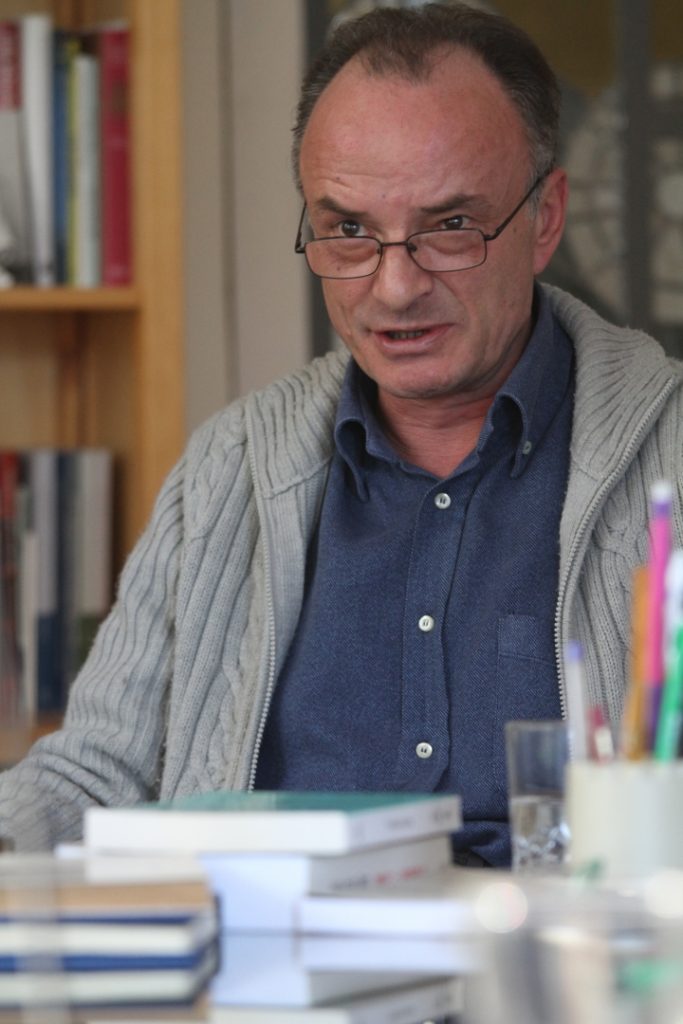
Wojciech Sikora was born on 16th April 1956 in Cracow. He studied Philosophy at the Jagiellonian University and he became involved in anti-social movements. He organized a boycott of the Cracovian yearly student carnival after the death of Stanisław Pyjas. He was the editor and distributor of underground publications and he was in the management board of the Independent Students’ Association.
For his anti-communist activity he was detained and arrested multiple times. At the beginning of 1981 he and his friends left Poland for a couple of months to roam about Europe. During the introduction of the martial law he was in France, where he stayed.
He continued his efforts for the benefit of the Polish resistance by organizing meetings and lectures on the “Solidarity” movement at universities in Sweden, Germany and France. He began cooperating with the Literature Institute in Maisons-Laffitte, one of the most significant Polish emigration publishing houses. He worked with the Free Europe Radio and organized scholarships for the creators of the Polish culture under the Aid Fund for Independent Literature and Science. His output in emigration for the benefit of “Solidarity” prevented his return to Poland until 1991.
Wojciech Sikora lives in France and is the director of the Literature Institute in Maisons-Laffitte.
Interviewed by Sebastian Furtak and Jacek Debis in October 2011 in Maisons-Laffitte.
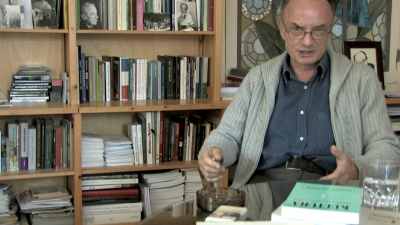
December 13th changed everything
My name is Wojciech Sikora, I was born in 1956, in Cracow. At the moment we are in the Maisons-Laffitte next to Paris, in the headquarters of the Literary Institute, I have been the head of for a year now. Sir, I belong to, so called, solidarity emigration. I mean, I left Poland in 1981. It was exactly the beginning of March 1981, right before the events in Bydgoszcz. It was a very trivial idea, I would say. I belonged to the Cracow opposition group, a student’s (organization), related to the Student’s Solidarity Committee, that had been established back in 1977, after the death of Staszek Pyjas, our friend. Well, and for those three years I had been actively involved in activities of the Cracow Student’s Solidarity Committee and the opposition. Once the Solidarity movement broke out, some opportunities of leaving Poland appeared, too. Of course, incredible opportunities arouse in all the areas, yet also in this positive field such as going abroad, that had been certainly not allowed in the past. Me and a couple of friends decided to take a chance and simply wander for a few months through several capital cities of the world. It was an idea of travelling around Europe, sightsee something and return to Poland near December. However, December 13 occurred in the meantime, that totally altered our plans. Holidays ended, and emigration started, I would say, as we believerd that it would not last for a long period. Yet, so many years have passed and I am here.
My name is Wojciech Sikora, I was born in 1956, in Cracow. At the moment we are in the Maisons-Laffitte next to Paris, in the headquarters of the Literary Institute, I have been the head of for a year now. Sir, I belong to, so called, solidarity emigration. I mean, I left Poland in 1981. It was exactly the beginning of March 1981, right before the events in Bydgoszcz. It was a very trivial idea, I would say. I belonged to the Cracow opposition group, a student’s (organization), related to the Student’s Solidarity Committee, that had been established back in 1977, after the death of Staszek Pyjas, our friend. Well, and for those three years I had been actively involved in activities of the Cracow Student’s Solidarity Committee and the opposition. Once the Solidarity movement broke out, some opportunities of leaving Poland appeared, too. Of course, incredible opportunities arouse in all the areas, yet also in this positive field such as going abroad, that had been certainly not allowed in the past. Me and a couple of friends decided to take a chance and simply wander for a few months through several capital cities of the world. It was an idea of travelling around Europe, sightsee something and return to Poland near December. However, December 13 occurred in the meantime, that totally altered our plans. Holidays ended, and emigration started, I would say, as we believerd that it would not last for a long period. Yet, so many years have passed and I am here.
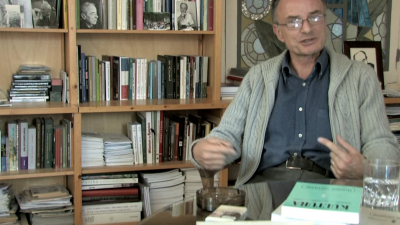
Long-lasting sense of temporariness
Well, December 13 changed everything somehow, but those days we didn’t absolutely feel that we would stay here as emigrants. For so many years we were staying here and not fully unpacking our suitcases and as late as after several years, several years… And actually only due to administration amenities, me, personally, as I don’t want to tell on behalf of others, I decided to ask for asylum. And it was after a couple of years after 1981 and it was the time I realized that the emigration could have lasted longer that I had expected or not expected.
Well, December 13 changed everything somehow, but those days we didn’t absolutely feel that we would stay here as emigrants. For so many years we were staying here and not fully unpacking our suitcases and as late as after several years, several years… And actually only due to administration amenities, me, personally, as I don’t want to tell on behalf of others, I decided to ask for asylum. And it was after a couple of years after 1981 and it was the time I realized that the emigration could have lasted longer that I had expected or not expected.
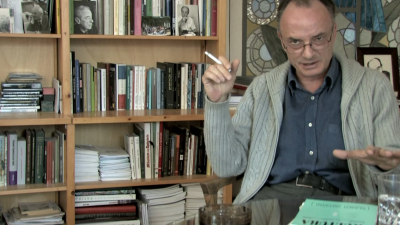
Polish-French friendship during "Solidarity" times
A friendly attitude of Frenchmen towards Poles was unbelievable those days. Really unbelievable. Obviously, it was intensified after announcing of the martial law. Yet, if we they only recognized someone speaking Polish, often while detecting the Solidarity badge we all wore. Then, we were called in the street, they had conversations with us, offered us the financial support. For several months there were absolutely no problems with finding an accommodation here. Me, as one of the representatives of the Independent and Self-Governing Union (NSZ), I had lots of meetings at the university. Here, there had already been Self-Governing Union aid committees, from Solidarity most of all. Since it was a recognizable (institution). Solidarity was something French people really lived and breathed with.
A friendly attitude of Frenchmen towards Poles was unbelievable those days. Really unbelievable. Obviously, it was intensified after announcing of the martial law. Yet, if we they only recognized someone speaking Polish, often while detecting the Solidarity badge we all wore. Then, we were called in the street, they had conversations with us, offered us the financial support. For several months there were absolutely no problems with finding an accommodation here. Me, as one of the representatives of the Independent and Self-Governing Union (NSZ), I had lots of meetings at the university. Here, there had already been Self-Governing Union aid committees, from Solidarity most of all. Since it was a recognizable (institution). Solidarity was something French people really lived and breathed with.
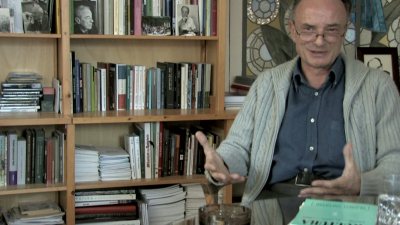
Emigration - a leap of faith
Emigration is never something easy. Of course, in no case, I wouldn’t like to compare living conditions in France to the situation in Poland those days, that was horrible. I am telling about a totally different dimension. Some sort of a dimension, meaning a withdrawal from your homeland, country, friends, family. Starting over absolutely everything. These are the things in some sort of an area, that are hard to be named. They seem to be quite hard. Certainly, we had a better living in France, than our friends Poland. From the material point of view, of course, there is no doubt about it. But this refugee status does have and used to have, as today it has changed, disadvantages and is related to some consequences. Various types of negative ones. So, in our home, since my wife is Polish, we always spoke Polish. Therefore, naturally our children spoke Polish. Yet, the children immediately grow older and, in addition the French education system is such that it practically fills in the entire week. From the morning till the evening you stay at school. Then, if you have any leisure time for fun, so you spend it in the French environment and so on. So, consequently, they become more French than Polish, despite the fact, that at home you speak, try to read fairy tales at the very early age, present Polish history, different kinds of things. The easiest way to learn history is to experience them yourself, so my kids quite often got interested most of all in what I had been doing in Poland. My children felt partially Poles, partially French. It depends where they are. This is characteristic. I didn’t go to Poland for 10 years, since I had no opportunity. I visited it for the first time, I’d say in 1991. A funny thing. When you were crossing the border with children. Until we reached the border they spoke French with each other. And once we crossed the border, something suddenly opened up, cracked and they started speaking Polish. As they were already in Poland, they spoke Polish. They got better and better. Then again, after 2-month holidays, they turned more into French. But they are deeply attached to Poland, they go to Poland very eagerly.
Emigration is never something easy. Of course, in no case, I wouldn’t like to compare living conditions in France to the situation in Poland those days, that was horrible. I am telling about a totally different dimension. Some sort of a dimension, meaning a withdrawal from your homeland, country, friends, family. Starting over absolutely everything. These are the things in some sort of an area, that are hard to be named. They seem to be quite hard. Certainly, we had a better living in France, than our friends Poland. From the material point of view, of course, there is no doubt about it. But this refugee status does have and used to have, as today it has changed, disadvantages and is related to some consequences. Various types of negative ones. So, in our home, since my wife is Polish, we always spoke Polish. Therefore, naturally our children spoke Polish. Yet, the children immediately grow older and, in addition the French education system is such that it practically fills in the entire week. From the morning till the evening you stay at school. Then, if you have any leisure time for fun, so you spend it in the French environment and so on. So, consequently, they become more French than Polish, despite the fact, that at home you speak, try to read fairy tales at the very early age, present Polish history, different kinds of things. The easiest way to learn history is to experience them yourself, so my kids quite often got interested most of all in what I had been doing in Poland. My children felt partially Poles, partially French. It depends where they are. This is characteristic. I didn’t go to Poland for 10 years, since I had no opportunity. I visited it for the first time, I’d say in 1991. A funny thing. When you were crossing the border with children. Until we reached the border they spoke French with each other. And once we crossed the border, something suddenly opened up, cracked and they started speaking Polish. As they were already in Poland, they spoke Polish. They got better and better. Then again, after 2-month holidays, they turned more into French. But they are deeply attached to Poland, they go to Poland very eagerly.
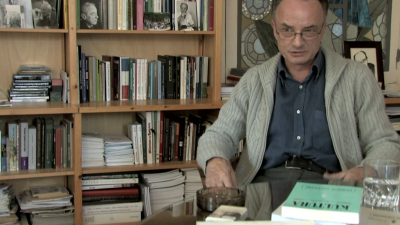
180 meters of Poland near Paris
I have been maintaining very tight relations with Poland. I have never had a feeling of losing Poland anyhow, while being on emigration. Since I had this special privilege, that since the very start, I have been bound with the people, who sacrificed their entire life for Poland. They did an excellent job such as (establishing) this place, we are in right now. Jerzy Giedroyć, Czapscy, Hercowieerzy Giedroyć, Czapscy, Hercowie. Culture. Well, it’s hard, you know, sir, to find more Polish place in the world than this one. Since the Literary Institute is currently one of the largest Poland-related archives. Not only Eastern Europe, Russia, this particular corner of the globe. Yet, here, there is an incredible collection of archives connected with Poland. There are not so many places like this, where the history of Poland has been described as here. In those 150 thousand letters of Jerzy Giedroyć, who… this was the main topic. With a few thousand ultimately interesting correspondents. These 180 meters of documents covering the issues of Poland and other countries are just here. I am still involved into it, as if… You know, sir, I don’t feel like I am Frenchman, well, I don’t know how to say it differently. I keep living and breathing with Poland. This way or other way. A different commitment over different periods. But, despite the fact that I have been living In France… Of course, I am not an emigrant, as the political emigration already terminated a long time ago. Nonetheless, I have remained basically such a Pole in France.
I have been maintaining very tight relations with Poland. I have never had a feeling of losing Poland anyhow, while being on emigration. Since I had this special privilege, that since the very start, I have been bound with the people, who sacrificed their entire life for Poland. They did an excellent job such as (establishing) this place, we are in right now. Jerzy Giedroyć, Czapscy, Hercowieerzy Giedroyć, Czapscy, Hercowie. Culture. Well, it’s hard, you know, sir, to find more Polish place in the world than this one. Since the Literary Institute is currently one of the largest Poland-related archives. Not only Eastern Europe, Russia, this particular corner of the globe. Yet, here, there is an incredible collection of archives connected with Poland. There are not so many places like this, where the history of Poland has been described as here. In those 150 thousand letters of Jerzy Giedroyć, who… this was the main topic. With a few thousand ultimately interesting correspondents. These 180 meters of documents covering the issues of Poland and other countries are just here. I am still involved into it, as if… You know, sir, I don’t feel like I am Frenchman, well, I don’t know how to say it differently. I keep living and breathing with Poland. This way or other way. A different commitment over different periods. But, despite the fact that I have been living In France… Of course, I am not an emigrant, as the political emigration already terminated a long time ago. Nonetheless, I have remained basically such a Pole in France.



